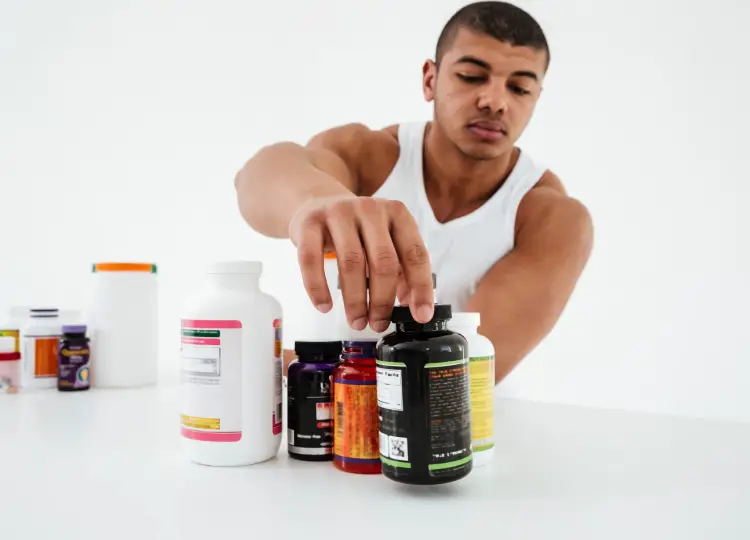Image by drobotdean on Freepik
Achieving optimal muscle growth and recovery is a goal shared by many fitness enthusiasts and athletes. While a balanced diet and regular exercise are essential components of muscle development, certain supplements can provide valuable support in your journey to a stronger, more muscular physique. In this article, we will explore some of the best supplements for muscle building and recovery, backed by scientific evidence and expert recommendations.
1. Whey Protein
Whey protein is one of the most popular and widely studied supplements for muscle building and recovery. It's derived from milk and is a complete protein, meaning it contains all essential amino acids required for muscle protein synthesis.
How it works: Whey protein provides a rapid source of amino acids, particularly leucine, which plays a key role in stimulating muscle protein synthesis. It's especially effective post-workout when your muscles are in need of quick recovery and growth.
Recommended dosage: A typical dose is 20-25 grams of whey protein post-workout, but individual needs may vary.
2. Creatine
Creatine is a naturally occurring compound found in small amounts in certain foods and synthesized by the body. It's stored in your muscles and used as a quick source of energy during high-intensity, short-duration activities like weightlifting and sprinting.
How it works: Creatine helps increase the body's phosphocreatine stores, which in turn enhances ATP (adenosine triphosphate) production. This boosts energy availability for intense muscle contractions, allowing you to lift heavier weights and perform better during workouts.
Recommended dosage: A common loading phase involves taking 20 grams per day (divided into 4 doses) for 5-7 days, followed by a maintenance dose of 3-5 grams per day.
3. Branched-Chain Amino Acids (BCAAs)
BCAAs consist of three essential amino acids: leucine, isoleucine, and valine. They are crucial for protein synthesis and muscle repair.
How it works: BCAAs can help reduce exercise-induced muscle damage and muscle soreness. Leucine, in particular, stimulates muscle protein synthesis.
Recommended dosage: Typically, 5-10 grams of BCAAs before or after workouts can be beneficial.
4. Beta-Alanine
Beta-alanine is a non-essential amino acid that combines with histidine to form carnosine, a compound that helps buffer the acid build-up in muscles during high-intensity exercise.
How it works: By increasing muscle carnosine levels, beta-alanine can delay the onset of muscle fatigue, allowing you to perform more reps or engage in longer-duration workouts.
Recommended dosage: A common dose is 2-5 grams per day, taken in divided doses.
5. L-Glutamine
L-glutamine is an amino acid found abundantly in muscle tissue. It plays a crucial role in protein synthesis and immune system support.
How it works: Glutamine may help reduce muscle soreness and support muscle recovery after intense exercise. It's particularly valuable during periods of high training volume.
Recommended dosage: 5-10 grams of L-glutamine per day can be beneficial for muscle recovery.
6. Fish Oil (Omega-3 Fatty Acids)
Fish oil is a rich source of omega-3 fatty acids, particularly eicosapentaenoic acid (EPA) and docosahexaenoic acid (DHA). These fatty acids have numerous health benefits, including anti-inflammatory properties.
How it works: Omega-3 fatty acids help reduce exercise-induced inflammation and muscle soreness, facilitating a faster recovery process.
Recommended dosage: A daily intake of 2-4 grams of combined EPA and DHA is typically recommended.
7. Vitamin D
Vitamin D is a fat-soluble vitamin that plays a role in calcium absorption, bone health, and muscle function.
How it works: Vitamin D deficiency can lead to muscle weakness and impaired muscle function. Ensuring adequate vitamin D levels can support overall muscle health.
Recommended dosage: The recommended daily intake varies based on age and individual needs. Consult with a healthcare professional to determine your specific requirements.
8. Magnesium
Magnesium is an essential mineral involved in muscle contractions, energy metabolism, and protein synthesis.
How it works: Magnesium supports muscle relaxation and reduces the risk of muscle cramps. It also plays a role in energy production, enhancing exercise performance.
Recommended dosage: The recommended daily intake of magnesium varies by age and gender. Consult with a healthcare provider to determine your specific needs.
9. Collagen
Collagen is the most abundant protein in the body and is essential for connective tissue health, including tendons and ligaments.
How it works: Collagen supplements may help reduce joint pain and inflammation, potentially aiding in recovery and injury prevention, especially for those engaged in high-impact sports.
Recommended dosage: Dosages vary, but a common recommendation is 10-20 grams per day.
10. Curcumin (Turmeric Extract)
Curcumin is a compound found in turmeric, known for its potent anti-inflammatory and antioxidant properties.
How it works: Curcumin may help reduce exercise-induced inflammation, muscle soreness, and oxidative stress, contributing to quicker recovery.
Recommended dosage: Dosages vary, but typically, 500-1,000 milligrams per day of curcumin extract is recommended.
Conclusion
While supplements can complement a well-rounded diet and exercise routine, it's essential to remember that they should not replace whole foods. A balanced diet that includes a variety of nutrient-rich foods should always be the foundation of your nutrition plan. Additionally, individual needs can vary, so it's wise to consult with a healthcare provider or a registered dietitian before adding any new supplements to your regimen.
When used wisely and in conjunction with a proper diet and exercise program, these supplements can support muscle building, aid in recovery, and help you achieve your fitness goals more effectively. Remember that consistency and dedication to your training regimen are key to maximizing the benefits of these supplements.





